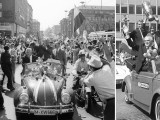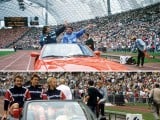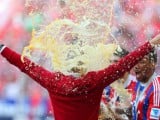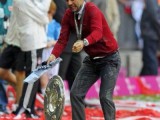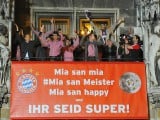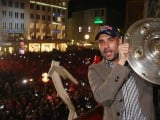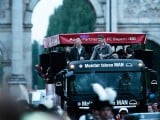taurus1
Ανώτερος
- Εγγρ.
- 8 Μαρ 2006
- Μηνύματα
- 5.517
- Κριτικές
- 31
- Like
- 1.474
- Πόντοι
- 6.305
Verzweifelt und Verflixt
by Rick Joshua
On the way to work this morning I’d be stuck in traffic, and and after fiddling a bit with the car’s in-built MP3 player I’d randomly spin the control to a random track. It would land on the Tyrolean folk group Die Ursprung Buam – and a typically foot-tapping ditty called Verzweifelt und verflixt – crudely translated, “desperate and confounded”.
These two words would sum up my mood completely having witnessed FC Bayern being torn apart by Real Madrid in what had been billed as another night of glory at the Allianz Arena, where my dreams of seeing Bayern in another Champions’ League final would turn into ninety minutes of sheer hell I would never be able to get back.
On St. George’s day the Bestia Negra would travel to the Spanish capital and return with a single-goal defeat having dominated possession; six days later, the white knight from Madrid would make his way to the beast’s lair in Bavaria and slay him in such a brutal fashion that it would be almost surreal. Bayern’s start would be reckless, their tactics would be clueless, and the attack would be toothless. The feared Bestia Negra had not only been slain by the white knight, it had been hacked to pieces and thrown to the crows.
Just three days earlier I had been at the Allianz to see Bayern’s Bundesliga game with strugglers Werder Bremen, and would leave the ground with mixed feelings having seen what was truly – I hate using the cliché – a game of two halves. The first forty-five minutes would see a Bayern team concentrate so much on possession that they had forgotten to defend – going into the break 2-1 down – while the second would see a massive improvement and four goals without reply, including three in a frenzied seven-minute spell.
We would all be left wondering which Bayern team would turn up against Madrid.
On what was always going to be the biggest game of the season at the Allianz, the supporters would be in great voice. The pre-match choreography would be spectacular, and if a team’s results were determined by their supporters Bayern would have won at a canter. Sadly, theBestia Negra’s army of red-clad guardians would not be able to keep the marauding white knight at bay.
Madrid had scored their goal in the first leg on the break with a fast move and much of the same would be expected from Carlo Ancelotti’s side, but the opener would border on the criminal. Still unable to defend set pieces effectively, a right-sided corner would miss every red shirt as Real right-back Sergio Ramos would have all the time in the world to direct his header past Manuel Neuer and into the Bayern net. The Bayern ‘keeper had almost gifted Los Meringues with an opener just moments earlier as he made one of his all-too-familiar forays out of the box, but could no nothing to prevent Real grabbing a crucial away goal to leave the home side needing at least three goals.
Four minutes later and just short of the twenty minute mark, it would all be over. From another set piece – this time a right-sided free-kick from Angel di Maria – the red-shirted defence would be found wanting once more as Ramos once again punctured the net. Ramos had only scored a handful of goals in over seventy Champions League appearances, and now the stunned crowd would be forced into seeing him celebrate two strikes in less than five minutes.
It would be the perfect response from Ramos, one of those things in football that commentators would describe as “written”. In the semi-final second leg two years earlier at the Bernabéu he had been roundly mocked for sending his spot-kick into orbit during the dramatic penalty shoot out, and here he would come into the steaming red cauldron and single-handedly kill off Bayern’s chances. From that point on, it would be a lost cause – more so as Bayern’s newly-adopted tiki-taka style just wouldn’t be suited to scoring four or more goals against a side that had conceded only nine goals in eleven games – which would become nine in twelve.
With the reckless and clueless defence handing the tie to Real on a silver platter, it would then be a matter of damage control for Pep Guardiola, and even this would end in failure. A typically fast goal on the break crafted by Gareth Bale and the irrepressible Cristiano Ronaldo would effectively put the nail in the coffin before half-time, and after a dire second half Ronaldo would send a cheeky skidding free-kick under the leaping Bayern wall with a minute remaining.
In the space of ninety painful minutes the dream of retaining the large silver trophy would be in tatters, and all the slow-burning, smouldering debate about the team’s progress – or lack of it – under Guardiola would almost immediately be reignited. For some, the defeat would be a wound that would have to be sustained in the name of progress. For others, it would be an unnecessary result of attempting to fix something that wasn’t actually broken.
Neutral analysts have been talking about the “Pep revolution” all season, with many of them standing firmly in his corner to defend any criticism of his tactics at all costs. It is different however for a Bayern fan, who this season has seen all the good things being tinkered with while the weaknesses have been allowed to fester. While Bayern’s patient buildup and passing game has clearly improved, their famous ability to execute the surgical strike on the break has all but disappeared. Against Madrid Bastian Schweinsteiger seemed to have forgotten how to move the ball forwards, the off-form Franck Ribéry would be more intent on striking an opponent on the face rather than striking fear into his opponents with those famous runs down the flanks, and Der Raumdeuter Thomas Müller, one of the most effective players under Jupp Heynckes, would be reduced to little more than a free-floating, aimless parody.
Meanwhile, Bayern’s curious inability to defend properly at set pieces would remain in place. One might have thought that the brain-burning horror of Didier Drogba’s equaliser in the 2012 final might have made improving this part of their game a serious priority, but every time Real placed the ball down by the corner flag it would be a case of sitting on one’s hands and hoping for the best. It is telling that for all the talk of Real’s fast counter-attacking play, three of their goals would come from set pieces: the first from a corner and the second and fourth from free-kicks.
I am surely speaking for the majority of decent Bayern fans when I say that it is no shame losing to a team like Real Madrid. They are an excellent side with talented players and a decent coach, and clearly deserve their place in the final after two clinical displays that were eerily reminiscent of Bayern’s deconstruction of Barcelona at the same stage last year. Even the score, despite it being a record home defeat in European competition and the biggest home defeat of any type since Arminia Bielefeld achieved the same 4-0 result in 1979, would not be a cause for concern in itself.
What really sticks in my throat was the complete lack of direction, and with it a lack of obvious passion and commitment. Of course, nobody can accuse the team of not trying, but this is how it would look. If you had switched the television on midway through the second half to see the men in red shorts shuffling about playing horizontal passes, you might have been conned into believing that they were the team three in front and strolling to a Saturday evening in Lisbon.
Once again Bayern would have two-thirds of the possession, a better corner count and six shots on target to Real’s five – but once again the statistics would not even tell half the story. Not one of those six chances would remotely threaten Iker Casillas – Ancelotti could have put a five year old between the sticks and his side would still have comfortably walked away with a clean sheet – but four of Real’s five shots at the Bayern goal would register on what would become a sorry-looking scoreboard.
They say it’s not the winning that counts but the taking part – a noble sentiment indeed, and acceptable if the taking part actually counts for something. In Bayern’s case – with the exception of the tireless Arjen Robben and second-half substitute Javi Martínez – they didn’t even turn up, let alone compete. The exclusion of Martínez from the starting lineup – with Toni Kroos installed in the defensive midfield – will always remain confusing to me, but what’s done is done. I just hope that those that make the decisions can learn from it.
After the historic start to the season and the early claiming of the Bundesliga title, things had been looking rosy for Pep Guardiola’s side. In March, Bayern fans would not just be hoping for another treble but almost expecting it. In statistical terms the season hasn’t been what one could call a disaster – far from it – but the way how the side would surrender their European title with nary a whimper would suck much of the emotional capital that everyone had invested over the course of the season. Even the domestic league and cup double doesn’t make up for it – after all, even Felix Magath achieved that twice.
Nevertheless, with the European dream now a fast-fading memory the final of the DFB-Pokal against a resurgent and confident Dortmund now has additional resonance. While Bayern will be looking to pick themselves up and secure yet another domestic double, the men from the Ruhr will be hoping to get their hands back on the bejewelled golden trophy in Berlin.
- See more at:
by Rick Joshua
On the way to work this morning I’d be stuck in traffic, and and after fiddling a bit with the car’s in-built MP3 player I’d randomly spin the control to a random track. It would land on the Tyrolean folk group Die Ursprung Buam – and a typically foot-tapping ditty called Verzweifelt und verflixt – crudely translated, “desperate and confounded”.
These two words would sum up my mood completely having witnessed FC Bayern being torn apart by Real Madrid in what had been billed as another night of glory at the Allianz Arena, where my dreams of seeing Bayern in another Champions’ League final would turn into ninety minutes of sheer hell I would never be able to get back.
On St. George’s day the Bestia Negra would travel to the Spanish capital and return with a single-goal defeat having dominated possession; six days later, the white knight from Madrid would make his way to the beast’s lair in Bavaria and slay him in such a brutal fashion that it would be almost surreal. Bayern’s start would be reckless, their tactics would be clueless, and the attack would be toothless. The feared Bestia Negra had not only been slain by the white knight, it had been hacked to pieces and thrown to the crows.
Just three days earlier I had been at the Allianz to see Bayern’s Bundesliga game with strugglers Werder Bremen, and would leave the ground with mixed feelings having seen what was truly – I hate using the cliché – a game of two halves. The first forty-five minutes would see a Bayern team concentrate so much on possession that they had forgotten to defend – going into the break 2-1 down – while the second would see a massive improvement and four goals without reply, including three in a frenzied seven-minute spell.
We would all be left wondering which Bayern team would turn up against Madrid.
On what was always going to be the biggest game of the season at the Allianz, the supporters would be in great voice. The pre-match choreography would be spectacular, and if a team’s results were determined by their supporters Bayern would have won at a canter. Sadly, theBestia Negra’s army of red-clad guardians would not be able to keep the marauding white knight at bay.
Madrid had scored their goal in the first leg on the break with a fast move and much of the same would be expected from Carlo Ancelotti’s side, but the opener would border on the criminal. Still unable to defend set pieces effectively, a right-sided corner would miss every red shirt as Real right-back Sergio Ramos would have all the time in the world to direct his header past Manuel Neuer and into the Bayern net. The Bayern ‘keeper had almost gifted Los Meringues with an opener just moments earlier as he made one of his all-too-familiar forays out of the box, but could no nothing to prevent Real grabbing a crucial away goal to leave the home side needing at least three goals.
Four minutes later and just short of the twenty minute mark, it would all be over. From another set piece – this time a right-sided free-kick from Angel di Maria – the red-shirted defence would be found wanting once more as Ramos once again punctured the net. Ramos had only scored a handful of goals in over seventy Champions League appearances, and now the stunned crowd would be forced into seeing him celebrate two strikes in less than five minutes.
It would be the perfect response from Ramos, one of those things in football that commentators would describe as “written”. In the semi-final second leg two years earlier at the Bernabéu he had been roundly mocked for sending his spot-kick into orbit during the dramatic penalty shoot out, and here he would come into the steaming red cauldron and single-handedly kill off Bayern’s chances. From that point on, it would be a lost cause – more so as Bayern’s newly-adopted tiki-taka style just wouldn’t be suited to scoring four or more goals against a side that had conceded only nine goals in eleven games – which would become nine in twelve.
With the reckless and clueless defence handing the tie to Real on a silver platter, it would then be a matter of damage control for Pep Guardiola, and even this would end in failure. A typically fast goal on the break crafted by Gareth Bale and the irrepressible Cristiano Ronaldo would effectively put the nail in the coffin before half-time, and after a dire second half Ronaldo would send a cheeky skidding free-kick under the leaping Bayern wall with a minute remaining.
In the space of ninety painful minutes the dream of retaining the large silver trophy would be in tatters, and all the slow-burning, smouldering debate about the team’s progress – or lack of it – under Guardiola would almost immediately be reignited. For some, the defeat would be a wound that would have to be sustained in the name of progress. For others, it would be an unnecessary result of attempting to fix something that wasn’t actually broken.
Neutral analysts have been talking about the “Pep revolution” all season, with many of them standing firmly in his corner to defend any criticism of his tactics at all costs. It is different however for a Bayern fan, who this season has seen all the good things being tinkered with while the weaknesses have been allowed to fester. While Bayern’s patient buildup and passing game has clearly improved, their famous ability to execute the surgical strike on the break has all but disappeared. Against Madrid Bastian Schweinsteiger seemed to have forgotten how to move the ball forwards, the off-form Franck Ribéry would be more intent on striking an opponent on the face rather than striking fear into his opponents with those famous runs down the flanks, and Der Raumdeuter Thomas Müller, one of the most effective players under Jupp Heynckes, would be reduced to little more than a free-floating, aimless parody.
Meanwhile, Bayern’s curious inability to defend properly at set pieces would remain in place. One might have thought that the brain-burning horror of Didier Drogba’s equaliser in the 2012 final might have made improving this part of their game a serious priority, but every time Real placed the ball down by the corner flag it would be a case of sitting on one’s hands and hoping for the best. It is telling that for all the talk of Real’s fast counter-attacking play, three of their goals would come from set pieces: the first from a corner and the second and fourth from free-kicks.
I am surely speaking for the majority of decent Bayern fans when I say that it is no shame losing to a team like Real Madrid. They are an excellent side with talented players and a decent coach, and clearly deserve their place in the final after two clinical displays that were eerily reminiscent of Bayern’s deconstruction of Barcelona at the same stage last year. Even the score, despite it being a record home defeat in European competition and the biggest home defeat of any type since Arminia Bielefeld achieved the same 4-0 result in 1979, would not be a cause for concern in itself.
What really sticks in my throat was the complete lack of direction, and with it a lack of obvious passion and commitment. Of course, nobody can accuse the team of not trying, but this is how it would look. If you had switched the television on midway through the second half to see the men in red shorts shuffling about playing horizontal passes, you might have been conned into believing that they were the team three in front and strolling to a Saturday evening in Lisbon.
Once again Bayern would have two-thirds of the possession, a better corner count and six shots on target to Real’s five – but once again the statistics would not even tell half the story. Not one of those six chances would remotely threaten Iker Casillas – Ancelotti could have put a five year old between the sticks and his side would still have comfortably walked away with a clean sheet – but four of Real’s five shots at the Bayern goal would register on what would become a sorry-looking scoreboard.
They say it’s not the winning that counts but the taking part – a noble sentiment indeed, and acceptable if the taking part actually counts for something. In Bayern’s case – with the exception of the tireless Arjen Robben and second-half substitute Javi Martínez – they didn’t even turn up, let alone compete. The exclusion of Martínez from the starting lineup – with Toni Kroos installed in the defensive midfield – will always remain confusing to me, but what’s done is done. I just hope that those that make the decisions can learn from it.
After the historic start to the season and the early claiming of the Bundesliga title, things had been looking rosy for Pep Guardiola’s side. In March, Bayern fans would not just be hoping for another treble but almost expecting it. In statistical terms the season hasn’t been what one could call a disaster – far from it – but the way how the side would surrender their European title with nary a whimper would suck much of the emotional capital that everyone had invested over the course of the season. Even the domestic league and cup double doesn’t make up for it – after all, even Felix Magath achieved that twice.
Nevertheless, with the European dream now a fast-fading memory the final of the DFB-Pokal against a resurgent and confident Dortmund now has additional resonance. While Bayern will be looking to pick themselves up and secure yet another domestic double, the men from the Ruhr will be hoping to get their hands back on the bejewelled golden trophy in Berlin.
- See more at:






